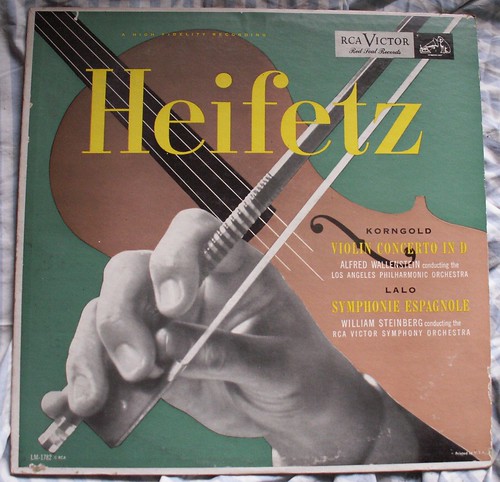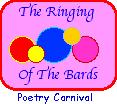Muse Fuel

Heifetz Plays Korngold and Lalo. From my collection of LPs that I grew up with.
(For the Sunday Scribblings prompt, "Compose.")
The link for me between music and writing goes back to preadolescence. I'd spent countless hours lying on the living room rug between my parents' stereo speakers, watching "home movies" unfold in my head. Before my maternal grandmother gifted me with a set of headphones when I went off to college, I experienced "telepathic stereo" (as I called it when I was a child) by tuning two radios to the same station and holding one against each ear.... (continued)
I came across this prompt two days after I received a CD that includes John Adams's Shaker Loops, which I'd gotten to update my recording on cassette dating from 1983. Adams's liner notes accompanying the CD mentions the music's role in the movie Barfly (which I have not yet seen), about poet Charles Bukowski. Adams writes of how Bukowski (Mickey Rourke) "holes up in a flophouse room, writing poems in a fit of inspiration to the accompaniment of the insistent buzz of 'Shaking and Trembling'" -- the first movement of the piece.
Shaker Loops drove the writing of my story "Arachne," which first appeared in the Nov./Dec. 1988 issue of Aboriginal Science Fiction and will be reprinted in the anthology Riffing on Strings: Creative Writing Inspired by String Theory (S. Miller & S. Verma, Eds., Scriblerus Press, June 2008). When I wrote "Arachne" I was headphoned into the cassette tape, which I played repeatedly. Shaker Loops proved the perfect vehicle to transport me into the story. (My process of writing "Arachne," more involved than some, is covered in this entry.)
Music is Muse fuel for me. I can point to individual stories, scenes, and characters linked to a musical "theme." I titled "Another Place" (Amazing, May 1988) after the track by the fusion jazz group Hiroshima, which I also played repeatedly while writing that story. (Thank goodness we now have digital music and auto-repeat!) I wrote much of Appetite, the sequel to Covenant in my Deviations series (and which will be released later this year) to the music of Einojuhani Rautavaara. The CD I have of his Cantus Arcticus, Piano Concerto #1, and Symphony #3 perfectly suited the book's winter settings.
Individual scenes driven by particular musical compositions include one in the early part of Covenant, fueled by Michael Torke's Ash, and one near the end, fueled by Peter Sculthorpe's Kakadu. Individual characters with their own themes include one who answered to Maurice Durufle's Messe Cum Jubilo (especially "Sanctus") and another who answered to the second movement of Rachmaninoff's Piano Concerto #4. Sometimes, if I was stuck figuring out the next scene, all I had to do was clear my mind and wait for the right "theme" to start playing in my head and that would direct me. I'd then hunt for the CD, pop it in, and let the visions do the rest. Sometimes I got insights about character relationships by listening to the music I associated with them, one piece after the other.
Late 19th and early 20th century classical music dominated the LPs in the house where I grew up. Those "old friends" included works by Isaac Albeniz, Samuel Barber, Bela Bartok, Hector Berlioz, Aaron Copland, Claude Debussy, Manuel DeFalla, Frederick Delius, Edward Elgar, Gabriel Faure, George Gershwin, Alberto Ginastera, Paul Hindemith, Gustav Holst, Alan Hovhaness, Charles Ives, Dmitri Kabalevsky, Aram Khachaturian, Zoltan Kodaly, Erich Wolfgang Korngold, Sergei Prokofiev, Sergei Rachmaninoff, Maurice Ravel, Ottorino Respighi, Camille Saint-Saens, Alexander Scriabin, Dmitri Shostakovich, Richard Strauss, Igor Stravinsky, Ralph Vaughan-Williams, and others.
Over the years I've added my own discoveries to the repertoire, including but not limited to William Alwyn, Arnold Bax, Leo Brouwer, John Corigliano, Philip Glass, Howard Hanson, Herbert Howells, Joseph Jongen, Witold Lutoslawski, Olivier Messiaen, Steve Reich, Ned Rorem, Albert Roussel, Miklos Rosza, Ravi Shankar, and William Grant Still, in addition to Adams, Durufle, Rautavaara, Skulthorpe, and Torke. I'd grown up with and use works of composers from earlier eras as well, like the "three Bs" (Bach, Beethoven, and Brahms). Some of my current novel draft is fueled on Beethoven and Mahler. I've also used jazz, rock, and world beat music as background to my writing.
A short story I'm currently drafting draws its musical fuel in part from music the story itself sent me to find. In my search for something my characters would listen to, I came across and downloaded Tempo 70's "El Galleton," which can be found here.
I am indebted to those who compose music, whose creative energies aid me in composing words.
 | Covenant, the first volume in the Deviations Series, is available from Aisling Press, and from AbeBooks, Amazon, Barnes and Noble, Book Territory, Borders, Buecher.ch, Buy.com, DEAstore, libreriauniversitaria.it, Libri.de, Loot.co.za, Powell's Books, and Target. The Deviations page has additional details. |











0 Comments:
Post a Comment
<< Home